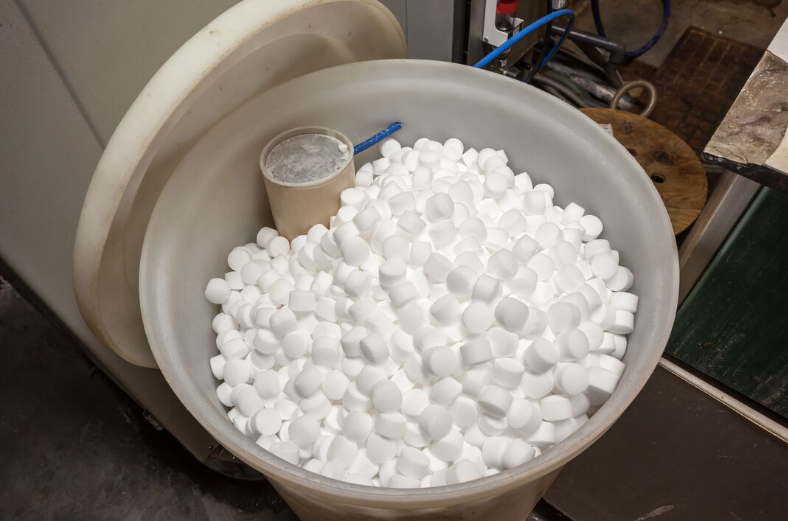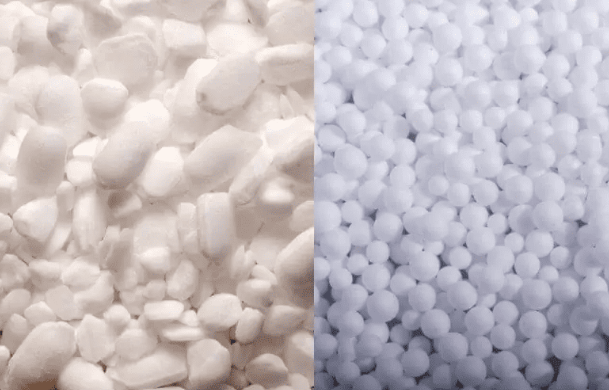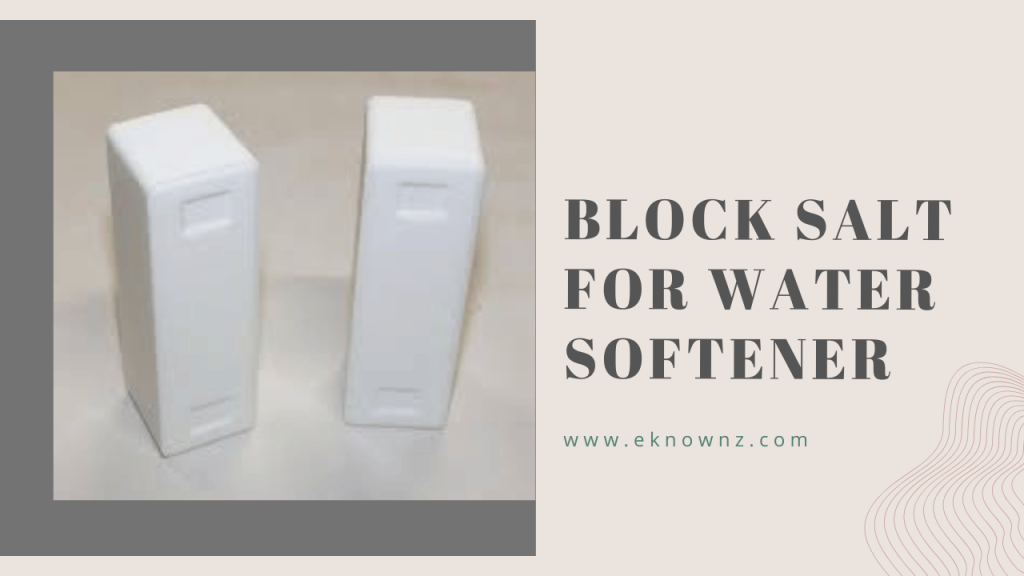Water quality plays a vital role in our daily lives, affecting everything from the taste of our morning coffee to the longevity of our household appliances. With the challenges of hard water becoming more apparent, the need for effective water softening solutions has never been greater. Enter block salt for water softeners.
In this article, we delve into the amazing benefits of using block salt, the innovation it brings to water softening, and answer some burning questions you might have.
How to Use Block Salt in a Water Softener?

Using block salt in your water softener is a straightforward process. Simply open the lid of your softener, place the block salt in the designated space, and let the system do its magic. Consult your device’s manual for precise instructions tailored to your specific model.
What is the Best Brand of Block Salt for Water Softeners?
Several reputable brands in the market offer high-quality block salt. However, the best brand often depends on individual preferences, regional availability, and specific softener models. Always choose a well-reviewed and trusted brand, and consult your softener’s manufacturer for recommendations.
Block Salt vs. Salt Pellets: What’s the Difference?

While both are effective in softening water, block salt offers a compact, efficient, and long-lasting solution. On the other hand, salt pellets might require more frequent refills and can sometimes leave residue in the softener.
Do Block Salt Water Softeners Require Less Maintenance?
Absolutely. Block salt softeners are a convenience many homeowners swear by. Their compact nature and slow dissolution rate often mean fewer refills and less maintenance.
Eco-friendly Water Softener Salt Blocks: A Green Alternative
Eco-friendly block salt options are making waves in the market. Made with sustainability in mind, these blocks not only soften your water but also reduce your carbon footprint.
Switching From Salt Pellets to Block Salt: Is it Possible?
Yes, many softener models allow you to switch from pellets to block salt seamlessly. However, always check your device’s compatibility before making the transition.
Understanding the Regeneration Process with Block Salt
The regeneration process with block salt ensures that your softener effectively exchanges calcium and magnesium ions, responsible for water hardness, with sodium ions. The block salt slowly dissolves in the system, facilitating the ion-exchange process and guaranteeing soft water.
Storage Tips for Block Salt
Store your block salt in a cool, dry place. Avoid direct sunlight and keep the blocks away from moisture to ensure their efficacy.
Can Block Salt Water Softeners Improve Tap Water Taste?
Indeed. By removing excess minerals responsible for hard water, block salt softeners can significantly improve the taste and clarity of your tap water.
The Evolution of Block Salt in Water Softening
Over the years, technological advancements in water treatment have consistently evolved to offer better solutions to hard water problems. Block salt, while not an entirely new concept, has increasingly gained traction due to its numerous advantages over traditional softening methods.
Block Salt Efficiency in Preventing Scale Buildup
One of the primary nuisances of hard water is the formation of scale on appliances, fixtures, and inside plumbing. This buildup not only affects the efficiency of these appliances but also their lifespan.
Block salt, with its consistent dissolution rate, offers a more uniform softening process. This efficient method ensures that scale buildup is significantly reduced, resulting in a noticeable difference in the health of household appliances.
Softening Hard Water with Block Salt Technology
The science behind block salt revolves around its ability to facilitate an ion exchange process more effectively. By replacing the hard minerals in water with sodium ions, block salt creates a softening effect that transforms the water quality significantly. Moreover, the technology used in block salt softeners ensures minimal wastage of water during the regeneration process.
Convenience of Using Block Salt in Water Softening Systems
Ask any homeowner about their water softening routine, and those using traditional methods will likely share tales of frequent maintenance and refilling tasks. Block salt, in its dense and compact form, requires less frequent attention. This convenience is a game-changer for many, allowing more time for other essential household chores.
Long-lasting Effects of Block Salt in Water Softening
Apart from the immediate advantages of using block salt, users also enjoy long-term benefits. Reduced maintenance extends the life of the water softener itself. Additionally, with consistent water quality, homeowners find fewer issues with plumbing over time.
Understanding the Dissolution Rate of Block Salt in Softeners
One of the intriguing aspects of block salt is its dissolution rate. Unlike traditional salt pellets, which might dissolve unevenly, block salt has a consistent rate. This ensures that the water remains consistently soft without periods of intermittent hardness.
Improving Water Quality with Block Salt
While the primary purpose of block salt is to soften water, users have reported improvements in overall water quality. From better-tasting drinking water to clearer water for household chores, block salt softeners promise an enhanced water experience.
Hard Water Treatment Using Block Salt
Hard water, characterized by high mineral content, is a challenge for many households. The use of block salt effectively reduces these minerals, ensuring that treated water is soft and suitable for all household purposes. Whether it’s for laundry, cooking, or bathing, the results are apparent.
Block Salt Usage for Residential Water Softening
While block salt softeners are versatile and can be used in various settings, their benefits in residential settings are particularly profound. Homeowners find that the transition to block salt offers them a more efficient, cost-effective, and hassle-free solution to hard water woes.
FAQs
1. What size of block salt should I use for my water softener?
This depends on your specific softener model. Most models will have guidelines on the size and weight of block salt optimal for use.
2. Can block salt water softeners help reduce skin irritation caused by hard water?
Yes, soft water can help reduce skin irritations, making showers more comfortable and beneficial for the skin.
3. How do block salt water softeners affect household appliances and plumbing?
Soft water can enhance the lifespan of your appliances by preventing scale buildup. Plumbing also benefits from reduced clogging and better water flow.
4. Are there any studies comparing block salt to other softening methods?
Multiple studies have highlighted the efficiency and cost-effectiveness of block salt over traditional methods. It’s always good to consult scientific journals or trusted industry publications for in-depth analyses.
5. What are the cost savings associated with using block salt water softeners?
While the initial investment might be similar to other softening methods, block salt softeners generally offer long-term savings due to reduced maintenance and increased appliance longevity.
Also Read: Where Are Amber Reflective Studs Found on a Motorway?
Conclusion
In conclusion, block salt for water softeners stands out as a leading solution in the battle against hard water. Its convenience, efficiency, and long-lasting effects make it a prime choice for homeowners looking to improve their water quality. Whether you’re seeking an eco-friendly alternative, a low-maintenance solution, or simply better-tasting water, block salt has got you covered.




